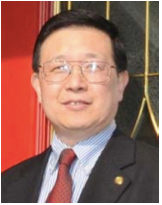 Yingxu Wang,
Yingxu Wang,
PhD, Prof., PEng, FWIF, FICIC, SMIEEE, SMACM
President, International Institute of Cognitive Informatics and Cognitive Computing(ICIC)
Director, Laboratory for Cognitive Informatics and Cognitive Computing
Dept. of ECE, Schulich School of Engineering, University of Calgary
2500 University Drive NW, Calgary, Alberta, Canada T2N 1N4
http://www.ucalgary.ca/icic/
Email: yingxu@ucalgary.ca
讲座时间:5 月 23 日上午 10 点
讲座地点:计算机楼 405 房间
Abstract
Cognitive informatics (CI) is a transdisciplinary field of sciences that studies the internal information processing mechanisms and processes of the brain, the underlying abstract intelligence (αI) theories and denotational mathematics, and their engineering applications in cognitive computing, computational intelligence, and cognitive systems [Wang, 2002, 2014]. This talk presents formal models of the brain from the facets of CI, αI, brain Informatics, neuroinformatics, and cognitive science. A formal model of the brain is established that maps the cognitive functions of the brain onto its neural structures. This work leads to a coherent αI theory based on both denotational mathematical models and cognitive science observations, which rigorously explains the underpinning principles and mechanisms of the brain by the Layered Reference Model of the Brain (LRMB) [Wang et al., 2006]. A set of mathematical models of neurons and neural networks has been developed in neuroinformatics [Wang, 2013] using contemporary denotational mathematics [Wang, 2008]. The neuroinformatics theory reveals structures and functions of the association, sensory and motor neurons for internal information representation, transmission, and manipulation [Wang & Fariello, 2014]. A pulse frequency modulation (PFM) theory of neural networks is established for rigorously analyzing the neurosignal systems in complex neural networks.
The aI theory, neuroinformatics models, and denotational mathematics enable the development of cognitive computers that perceive, think, and learn. As classic computers being data processors, the cognitive computers are knowledge processors based on contemporary denotational mathematics. A wide range of applications of cognitive computers have been developing in ICIC (http://www.ucalgary.ca/icic/) such as, inter alia, cognitive robots, cognitive learning engines, cognitive Internet, cognitive knowledge bases, cognitive search engines, and cognitive systems.
About the Speaker
Yingxu Wang is professor of cognitive informatics and denotational mathematics, President of International Institute of Cognitive Informatics and Cognitive Computing (ICIC, http://www.ucalgary.ca/icic/) at the University of Calgary. He is a Fellow of ICIC, a Fellow of WIF (UK), a P.Eng of Canada, and a Senior Member of IEEE and ACM. He received a PhD in computer science from the Nottingham Trent University, UK. He was visiting professors (on sabbatical leave) at Oxford University (1995), Stanford University (2008), UC Berkeley (2008), and MIT (2012), respectively. He is the founder and steering committee chair of the annual IEEE International Conference on Cognitive Informatics and Cognitive Computing (ICCI*CC) since 2002. He is founding Editor-in- Chief of Int. Journal of Cognitive Informatics & Natural Intelligence (IJCINI), founding Editor-in-Chief of Int. Journal of Software Science & Computational Intelligence (IJSSCI), Associate Editor of IEEE Trans. on SMC (Systems), and Editor-in-Chief of Journal of Advanced Mathematics & Applications (JAMA). Dr. Wang is the initiator of a few cutting-edge research fields such as cognitive informatics, denotational mathematics (concept algebra, process algebra, system algebra, semantic algebra, and inference algebra), abstract intelligence (aI), cognitive computing, cognitive knowledge base theory, and basic studies in neuroinformatics, software science,fuzzy mathematics, cognitive linguistics, and computational intelligence. He has published 400+ peer reviewed papers and 26 books in cognitive informatics, denotational mathematics, cognitive computing, software science, and computational intelligence. He is the recipient of dozens international awards on academic leadership, outstanding contributions, best papers, and teaching in the last three decades.


